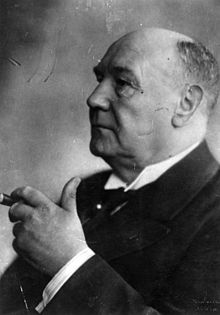Wilhelm Solf
| Wilhelm Solf | |
|---|---|
 |
|
| Secretary for Foreign Affairs | |
|
In office 3 October 1918 – 13 December 1918 |
|
| Monarch | Wilhelm II (until 9 Nov. 1918) |
| Chancellor |
Max von Baden Friedrich Ebert |
| Preceded by | Paul von Hintze |
| Succeeded by | Ulrich von Brockdorff-Rantzau |
| Secretary for the Colonies | |
|
In office 1911–1918 |
|
| Monarch | Wilhelm II |
| Preceded by | Friedrich von Lindequist |
| Succeeded by | Philipp Scheidemann |
| Governor of German Samoa | |
|
In office 1 March 1900 – 1911 |
|
| Monarch | Wilhelm II |
| Preceded by | new office |
| Succeeded by | Erich Schultz-Ewerth |
| Personal details | |
| Born |
October 5, 1862 Berlin, Prussia (now in Germany) |
| Died | February 6, 1936 (aged 73) |
Wilhelm Heinrich Solf (5 October 1862 – 6 February 1936) was a German scholar, diplomat, jurist and statesman.
Wilhelm Solf was born into a wealthy and liberal family in Berlin. He attended secondary schools in Anklam in western Pomerania and in Mannheim. He took up the study of Oriental languages, in particular Sanskrit at universities in Berlin, Göttingen and Halle, earning a doctorate in philology in the winter of 1885. Under the supervision of the well-known Indologist Richard Pischel, he wrote an elementary grammar of Sanskrit.
He then found a position at the library of the University of Kiel. While residing there he was drafted into the Imperial Navy to serve his military obligation. However, he was deemed medically unfit for military service and discharged.
Solf joined the German Foreign Office (Consular Service) on 12 December 1888 and was assigned to the Imperial German Consulate General in Calcutta on 1 January 1889. However, he resigned from the consular service after three years to study law at the University of Jena where he obtained his doctorate in law (Doktor juris) in September 1896. His advanced degrees qualified Solf for higher positions in the diplomatic service. He joined the Colonial Department of the Foreign Office (Kolonialabteilung des Auswärtigen Amtes) and in 1898 was assigned as district judge in Dar es Salaam in German East Africa for a short period. In 1899 he was posted to the Samoan Islands, where he served as council chairman in the provisional government of the municipality of Apia, Samoa.
The division of the Samoan Islands as a result of the Tripartite Convention of 1899 assigned the western islands to Germany (independent Samoa today) and Eastern Samoa to the United States (American Samoa today). Wilhelm Solf, at age 38, became the first Governor of German Samoa on 1 March 1900. "Solf was a man of quite unusual talent, clear-thinking, sensitive to the nuances of Samoan attitudes and opinion." He was known as a liberal, painstaking and competent administrator. Solf included Samoan traditions in his government programs, but never hesitated to step in assertively, including banishment from Samoa in severe cases, when his position as the Kaiser's deputy was challenged. Under Solf's direction, plantation agriculture was further encouraged; in his judgment it provided the soundest basis for the colony's economic development. In turn, tax revenues were enhanced, making the establishment of a public school system, the construction and staffing of a hospital (including the training of Samoan nurses) major successes. Road and harbor facilities construction was accelerated. In all, the Samoan colony was on its way to self-sufficiency and actually reached that achievement just before Solf was called to Berlin and was succeeded by Erich Schultz as Governor of German Samoa.
...
Wikipedia
